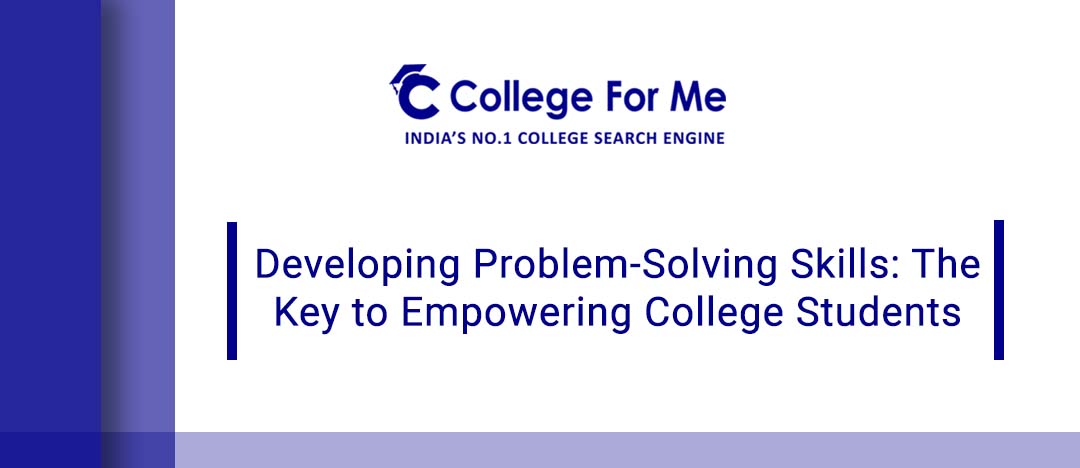Career Scopes Of A B.Tech. Student
There is a high demand for B.Tech. degree holders in the private sector, yet, there is also the opti...

Problem-solving skills are vital for success in both personal and professional domains. In today's complex and rapidly changing world, college students face multifaceted challenges that require them to think critically, analyze situations, and devise effective solutions. Developing problem-solving skills is not only crucial for academic excellence but also essential for fostering adaptability, resilience, and innovation. This article delves into the importance of cultivating problem-solving skills among college students and explores effective strategies for their development.
The Importance of Problem-Solving Skills:
1. Academic Success: Problem-solving skills play a fundamental role in academic achievement. They enable students to navigate through complex coursework, tackle challenging assignments, and engage in critical thinking. Students with well-honed problem-solving abilities are better equipped to comprehend complex problems, break them down into manageable components, and develop effective solutions.
2. Workplace Readiness: Employers today seek graduates who possess strong problem-solving abilities. The professional world is characterized by ambiguity, uncertainty, and evolving challenges. College students who can approach problems analytically, think creatively, and propose innovative solutions have a distinct advantage in the job market. Problem-solving skills are often linked with leadership, teamwork, and decision-making prowess, all of which are highly valued by employers.
Strategies for Developing Problem-Solving Skills in College Students:
1. Encourage Critical Thinking: Colleges should foster an environment that encourages critical thinking. Professors can design assignments and projects that require students to analyze, evaluate, and synthesize information. Classroom discussions should be structured to promote questioning, debate, and exploration of alternative perspectives. Such activities develop students' abilities to think critically, consider multiple viewpoints, and arrive at well-informed conclusions.
2. Active Learning and Experiential Education: Hands-on experiences can significantly enhance problem-solving skills. Incorporating active learning methodologies such as group projects, case studies, simulations, and internships allows students to apply theoretical knowledge to real-world scenarios. These experiences develop their ability to identify problems, collect relevant data, analyze information, and propose practical solutions.
3. Collaboration and Teamwork: Problem-solving often requires collaboration and teamwork. Colleges should provide opportunities for students to work in groups, encouraging them to pool their diverse knowledge, skills, and perspectives. Collaborative problem-solving not only enhances critical thinking but also fosters effective communication, conflict resolution, and the ability to leverage collective intelligence.
4. Integration of Technology: Embracing technological tools can enhance problem-solving skills. Colleges should leverage digital resources, such as data analytics platforms, programming languages, and simulation software, to expose students to real-world problem-solving contexts. Incorporating technology-based assignments and projects cultivates students' proficiency in utilizing tools for data analysis, modeling, and problem-solving.
5. Reflection and Self-Assessment: Encouraging students to reflect on their problem-solving processes and outcomes is essential. Reflection promotes metacognition, allowing students to analyze their approaches, identify strengths and weaknesses, and refine their problem-solving strategies. Self-assessment tools and feedback mechanisms can further aid students in understanding their progress and areas for improvement.
Conclusion:
Nurturing problem-solving skills in college students is crucial for their overall development and future success. By actively incorporating critical thinking, active learning, collaboration, technology integration, and reflection into the college curriculum, educators can create an environment that fosters robust problem-solving abilities. Equipped with these skills, college students will be better prepared to face the challenges of the ever-evolving world, make informed decisions, and contribute meaningfully to their professions and society at large.

There is a high demand for B.Tech. degree holders in the private sector, yet, there is also the opti...

If you are looking for a bright and prospective career, then getting a B.Tech. in CSE must be under ...
Comments (0)